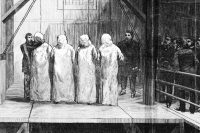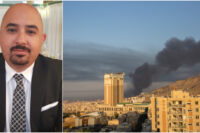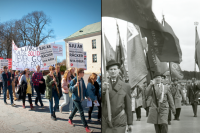
När det gäller konflikten i Syrien verkar diplomati snarare än krig vara svårast att smälta för västerländska “åskådare”. Men den politiska makten måste förutsätta att allmänheten kan hantera komplexitet och kompromisser, skriver Mark Leonard.
People used to ask whether democracies had the makeup for war. But when it comes to Syria, it seems that it is diplomacy rather than warfare that is most difficult for Western onlookers to digest. As the carnage, dislocation and suffering grow, Western leaders seem more comfortable talking about limited military intervention than embracing the morally awkward choices they would need to make to achieve a political settlement. The problem is that the logic of diplomacy and the logic of democracy seem increasingly at odds.
In the glaring light of a democratic age, governments are expected to deliver moral clarity, rapid action and ambitious objectives while dealing with friends and isolating enemies. But in the private world of diplomacy, officials deal in shades of gray. They play for time rather than precipitating action, they set limited objectives and they often engage their enemies. The iconic diplomat George F. Kennan wrote in an essay called “Morality and Foreign Policy” that, “the primary obligation of a government is to the interests of the national society it represents, not to the moral impulses that elements of that society may experience.”
Although Secretary of State John Kerry has calmed the drums of war and reached out to his Russian counterpart to develop a peace process, much of his subsequent rhetoric ‑ from calling for Syrian President Bashar al-Assad’s departure to supporting the lifting of the European arms embargo ‑ seems to be more motivated by the moral-politik of democratic politics than the realpolitik of diplomacy.
As Julien Barnes-Dacey and Daniel Levy argue in a new ECFR report, it will be impossible to de-escalate the crisis in Syria by sticking to the comfortable pronouncements of Western politicians.
Rather than insisting that Assad must leave as a precondition for peace talks with the nation, the West should accept that his fate must be a topic for the discussions. Rather than moving toward action by lifting arms embargoes or equipping the rebels, the West should use its leverage to persuade outside backers of the conflict to slow the flow of arms. Rather than defining their objectives expansively to include the fall of Assad or the curtailing of Iran, the West should narrow the goals to reducing and containing the violence in Syria. And finally, rather than excluding key players such as Iran from the talks on the grounds that they will be spoilers, they should promote an inclusive process that contains all the main players.
Jeremy Shapiro ‑ who until recently was a diplomat working on Syria for the U.S. State Department ‑ has argued that, “You make peace with your enemies, not your friends. The reason to involve the Iranians is because talking to that enemy is the only conceivable route to achieving a political settlement in Syria.” Although Western diplomats concede many of these points, politicians have been reluctant to implement them or even discuss them in public.
In many ways, the reluctance is a sign of incredible progress in the making of foreign policy. It used to be that matters of war and peace were delegated to elites who would make decisions in the national interest behind closed doors with only limited attempts to inform the public and legitimate their actions.
The first war I witnessed as an adult was the conflict in Bosnia. I was working in the office of a British Member of Parliament as the West’s political elite found ever more elegant phrases to justify their inaction while carnage unfolded in a little-known corner of Europe. When human rights groups pointed to the scale of the genocide, U.S. Secretary of State Jim Baker argued that the United States doesn’t “have a dog in that fight.” When some argued that the West should at least lift the arms embargo that prevented Bosnians from defending themselves against Serbia’s president, Slobodan Milosevic, the British Foreign Secretary Douglas Hurd declared this would simply create “a level killing field.” The embrace of diplomatic caution cost thousands of lives, and it placed a stain on the reputation of the European project.
It is no wonder that the next generation of political leaders recoiled from the idea of foreign policy without morality. Politicians and diplomats in the baby-boomer generation opened the process of international relations. They understood that they would need to win public support for their actions in a world increasingly defined by instant communication within and between democracies. Less than a decade after the Bosnian war, Britain’s prime minister, Tony Blair, argued that human-rights concerns justified action in Kosovo.
The boomer generation’s rhetoric was carefully calibrated. In his famous speech on the doctrine of international community, delivered in the midst of the Kosovo crisis, Blair set out five tests for intervention. They included questions such as, “Have we exhausted all diplomatic options?” and “Are we prepared for the long term?” Rather presciently, he said, “In the past we talked too much of exit strategies. But having made a commitment we cannot simply walk away once the fight is over; better to stay with moderate numbers of troops than return for repeat performances with large numbers.”
Given Western language on Assad’s fate and the refusal of politicians to reach out to the regional powers such as Iran that are fueling the conflict, it is hard to argue that the West has exhausted all diplomatic options. It is even more difficult to claim that it is prepared for the long term. The European Union still has troops stationed in Bosnia and Kosovo. The EU’s aid is the biggest source of revenue for those two countries. Special representatives still act as viceroys over the countries’ dysfunctional and divided politics. They are the main arbiter of their politics and have even offered them the long-term prospect of becoming EU members.
Even the most avid supporters of military action, such as Senators John McCain (R-Ariz.) and Lindsay Graham (R-S.C.), are ruling out similar long-term involvement in Syria. They have declared that they are opposed to putting “boots on the ground,” seeming to view the Syrian challenge through the prism of the conflict in Libya.
Western politicians are increasingly moving to a kind of “war by proxy,” using drones, allies and arming local forces to escape the tough choices involved in real diplomacy or direct intervention. In these circumstances, there is a real danger that military engagement becomes no more than a “hit and run” operation.
Until Kerry and Russia’s foreign minister, Sergey Lavrov, announced their diplomatic initiative on May 7, there was a widespread sense that opting for limited intervention might be the path of least resistance in Syria. There are still many reasons to fear that their Geneva conference, now being pushed back to June, will end in failure. The planning meetings show little cohesion on the specifics, such as who should attend and what should be on the agenda.
Assad’s forces are making gains in their fights with the rebels with help from Hezbollah, the opposition is divided and on the ground the sectarian war rages. But more worrisome is possibly the reluctance of Western politicians to give politics a real chance of success. It is heartening that the closed world of diplomacy has been opened to public discourse, but it is depressing that our leaders assume the public’s attention has been degraded to the point that it cannot cope with complexity. Unless they manage to get beyond the moral absolutism of their current discourse and explain the compromises necessary for political solutions, Western leaders might inadvertently end up dragging their citizens into the very ground war they are trying to avoid.
Följ Dagens Arena på Facebook och Twitter, och prenumerera på vårt nyhetsbrev för att ta del av granskande journalistik, nyheter, opinion och fördjupning.


































